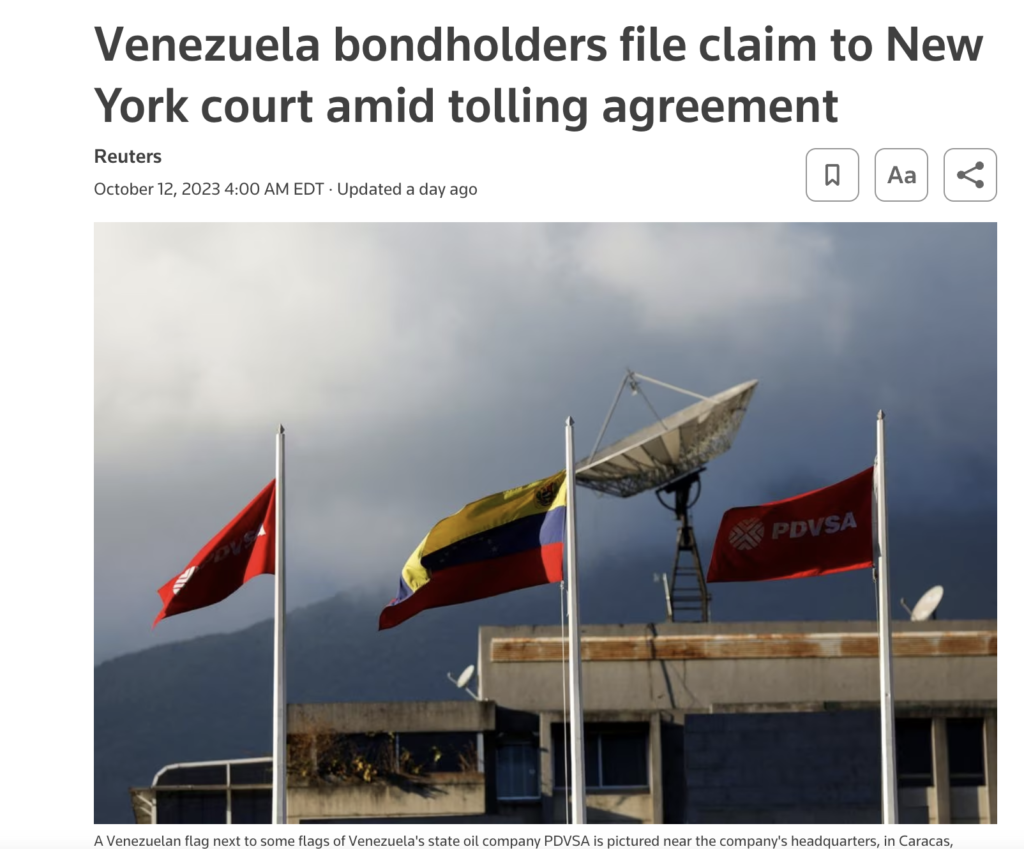How did the Republic and PDVSA extend the statute of limitations?

Source: Reuters
Shortly after I published an update report about the six-year statute of limitations (SOL) that applies to Venezuelan bonds governed by New York Law, on October 12, 2023, the Venezuelan Creditor Committee published a statement regarding the “Filing Summons with Notice and Stipulation of Dismissal in New York State Court”. With the limited available information, it is possible to deduce that the following strategy was implemented to avoid the prescription of the bondholders’ rights:
- Some bondholders filed claims related to certain certain “bonds (the “Bonds”) issued by the Republic of Venezuela (“Venezuela”) and Petróleos de Venezuela, S.A. (“PDVSA”) in the Supreme Court of the State of New York, County of New York”. That means that instead of a tolling agreement, the strategy was to file claims to preserve bondholders’ rights.
- The Republic and PDVSA, acting through accredited attorneys and the plaintiffs, “filed Stipulations and Proposed Orders of Discontinuance Without Prejudice“. Therefore, the issuers (defendants) and the bondholders (plaintiffs) entered a settlement agreement regarding the claims.
- As a result of the settlement agreement, the defendants agreed to extend the statute of limitations until December 31, 2028. Accordingly, the plaintiffs could preserve their rights following the Resolution passed by the National Assembly on August 2023.
- As we explained, that Resolution did not have direct legal consequences in New York. It was necessary to enter the settlement agreements to extend the SOL effectively.
One of the legal problems to advance in a tolling agreement -an efficient and transparent instrument- is the lack of legal certainty about the representation of the Republic as an issuer. Therefore, bondholders decided to preserve their rights through a stipulated judgment because the Republic has been acting before the US courts through attorneys -in some cases, engaged by the now defunct Office of the Special Attorney General. PDVSA has also been represented by the lawyers acting in courts on behalf of the ad-hoc board created in 2019. Because, so far, the representation of the Republic and PDVSA in courts has not been challenged, the strategy adopted was to extend the SOL through the courts -although it is a suboptimal solution compared to the tolling agreement.
Two main concerns should be addressed regarding this strategy:
The first one is the doubts about the authority of the Asset Protection Committee (“APC” or CAPA in Spanish) to represent Venezuela legally. The ACP was created in the 2023 Transition Statute, which, according to some scholars, violated the Constitution.
The second one is that this solution only preserves the rights of the bondholders who filed the claims. Although there is no public information about the bonds this settlement covers, other bondholders could have been excluded from this strategy.
With regard to the legal uncertainties surrounding the authority of the ACP, it’s important to emphasize that such doubts do not automatically render the settlement agreements null and void under Venezuelan law. Nonetheless, it is crucial to establish a robust legal framework, given that the Resolution is not a legislative decision.